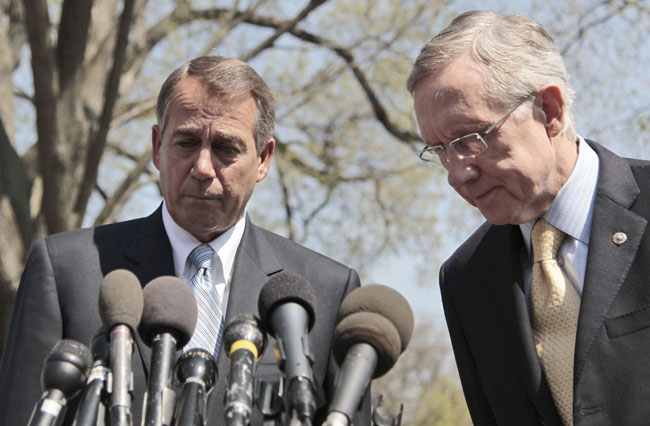A too-timid budget deal
Tuesday, April 12, 2011
As you likely know by now, there was not a federal government shutdown Saturday. President Barack Obama, the Democrat-run Senate and the Republican-run House of Representatives struck a last-minute deal late Friday to continue funding operations of the government through this week. And later this week, the House and Senate are both expected to pass a bill to keep the government going for the rest of the fiscal year, which ends in September.
The deal has a few worthwhile features, but overall, its $38.5 billion in cuts are inadequate. We are, after all, a nation with more than $14 trillion in debt. Congress should be cutting far more than $38.5 billion.
Still, with big-spending Democrats in control of the White House and the Senate, it is remarkable that the Republican House managed to get even those budget cuts approved.
Commendably, the deal will restrict the use of taxpayer dollars for abortions in the District of Columbia.
Also, it rightly restores a successful voucher program that lets children in failing schools in Washington escape to private schools - at a fraction of the cost of educating them in the city's disastrous public schools.
But on the down side, Planned Parenthood, the nation's biggest abortion provider, will disgustingly continue to get federal funds. Technically, that money cannot be used for abortions, but giving Planned Parenthood tax dollars for services besides abortions obviously frees up its other money for abortions.
Regrettably, Democrats also blocked an attempt to prevent the Environmental Protection Agency from issuing harsh anti-global-warming restrictions - rules that Congress declined to enact even when it was run completely by Democrats.
If Congress was unwilling to permit such economy-crushing regulations, the president should not do an end run around lawmakers. As Sen. Saxby Chambliss, R-Ga., has noted: "Congress is the appropriate branch of the federal government to debate and design a climate change policy. I do not appreciate the implied threat that if Congress does not go along with the EPA, the agency will impose costly regulations" on its own.
If this timid budget deal is a first step toward fiscal responsibility, that's good. But if it is just a slight cut before big, reckless spending starts again, it will be of little benefit.
